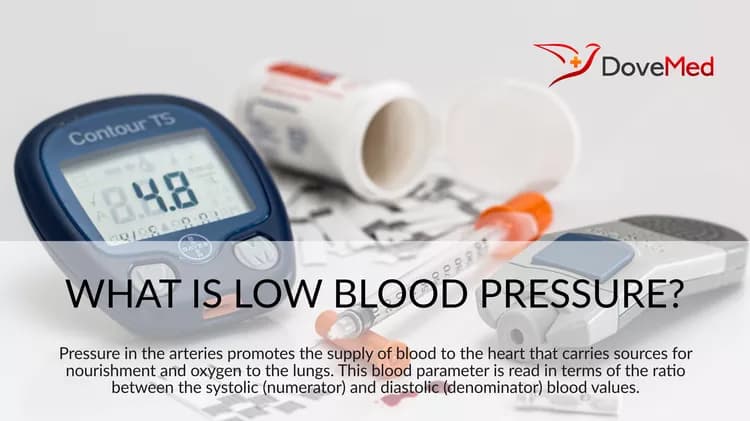Pressure in the arteries promotes the supply of blood to the heart that carries sources for nourishment and oxygen to the lungs. This blood parameter is read in terms of the ratio between the systolic (numerator) and diastolic (denominator) blood values. Blood pressure is a common medical terminology. Blood pressure ranges vary among individuals depending on various factors. Normal blood pressure is considered to be 120/80 mm Hg; however, when the pressure exerted by the blood on the arterial walls is as low as 90/60mm Hg or even lower, the condition is termed as low blood pressure, also referred to as “hypotension.”
The most common etiological reasons contributing to a fall in blood pressure are:
- Pregnancy - on account of rapid increase in physiologic blood volume
- Cardiac issues - such as lowered heart rate or heart valve associated problems
- Endocrine complications - such as diabetes, Addison’s disease, adrenal insufficiency, and many other
- Dehydration - this may in turn be caused due to vomiting, diarrhea, use of diuretics
- Losing blood - loss of blood due to injuries, accidents, or surgeries
- Severe infections, allergic responses or dietary insufficiencies
- Certain diuretics, antidepressants, drugs prescribed for Parkinson’s disease, alpha and beta blockers may cause the blood pressure to dip.
As a result, low blood pressures are clinically manifested by the following signs and symptoms:
- Pale skin
- Headaches, dizziness, and lack of concentration
- Blurred vision
- Nausea
- Fatigue and weakness
- Quick shallow breathing
- Increased thirst
Other reasons on the basis of which hypotension may be further classified are:
- Postural/orthostatic hypotension: It is the sudden drop in blood pressure on standing up, after a long resting posture. Ideally blood pools in the legs in response to gravitational force and the heart rate and blood vessel constriction are increased to counter balance this effect and ensure sufficient blood supply to the brain. However, in this form of hypotension the counter-balance mechanism fails and the brain experiences a shortage of oxygen nourishment leading to dizziness, headaches, and black-outs. Prolonged bed rest, pregnancy, burns/excessive heat, cardiac complications, and varicose veins, can also be causatives of orthostatic hypotension. This form is common among the elderly and the drop of blood pressure is evident in most cases early in the morning, as researched by Weiss and co-authors in 2003, through a study.
- Post-prandial hypotension: This one is rather common and often experienced by the elderly adults after a meal. The blood pressure dips due to failure of response mechanisms that need to increase the heart rate. Individuals with autonomic nerve disorders or hypertension are usually vulnerable to this form of hypotension. A study presented by Ong and co-authors in 2014 suggests that medications are effective in prevent post-prandial hypotension, but unfortunately not as significant in symptomatic cases.
- Neural hypotension: This type attacks most young people who stand for a prolonged duration. It is a result of the left heart ventricle signaling the brain that the pressure of the blood is high, in response to which the blood pressure is lowered. Gradually blood accumulates at the legs and begins to cut-off supply to the brain itself.
- Multiple system atrophy (Shy Dragers Syndrome): Caused due to a nervous damage leading to orthostatic hypotension in combination with elevated blood pressures while one is lying down.
The best way to diagnose a low blood pressure is through blood tests, electrocardiograms, and echocardiogram that will aid in assessing the heart structure, function, and rate. The valsalva maneuver, stress tests, and the tilt table tests are also helpful. Hypotension can largely reduce oxygen availability required to carry out normal physiological functions and hence, it is not going to be a good idea to ignore it.
Increasing fluid intake, consuming small frequent meals low on carbohydrates, increasing sodium sources in the diet, wearing compression stockings, and adhering to prescribed medication routines is helpful.
Related Articles
Test Your Knowledge
Asked by users
Related Centers
Related Specialties
Related Physicians
Related Procedures
Related Resources
Join DoveHubs
and connect with fellow professionals


0 Comments
Please log in to post a comment.